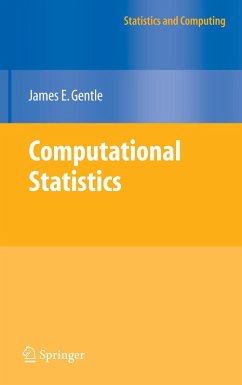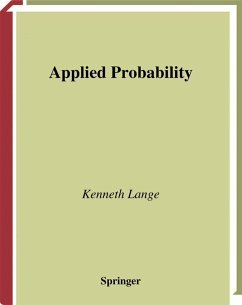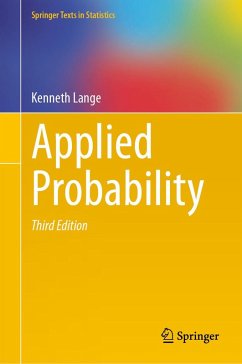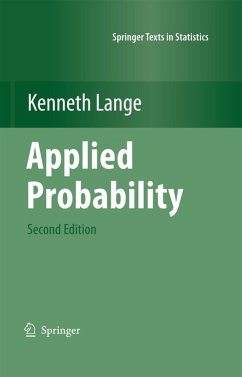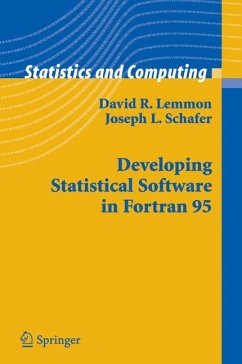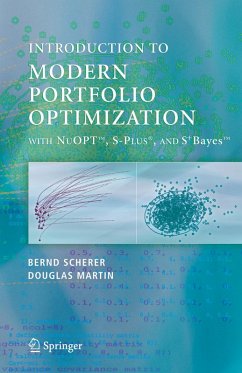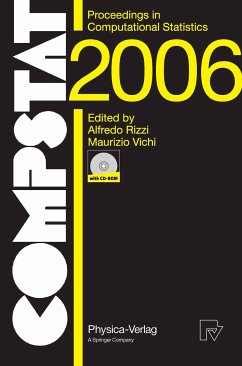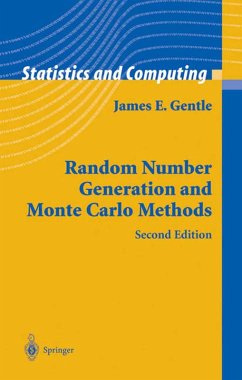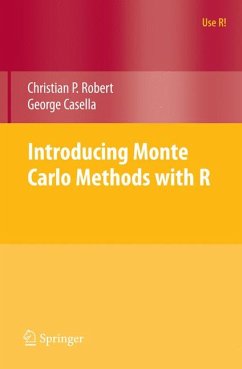
James E. Gentle
eBook, PDF
Elements of Computational Statistics (eBook, PDF)
Versandkostenfrei!
Sofort per Download lieferbar
Weitere Ausgaben:

PAYBACK Punkte
40 °P sammeln!





This book describes techniques used in computational statistics and considers some of the areas of application, such as density estimation and model building, in which computationally-intensive methods are useful.
Dieser Download kann aus rechtlichen Gründen nur mit Rechnungsadresse in A, B, BG, CY, CZ, D, DK, EW, E, FIN, F, GR, HR, H, IRL, I, LT, L, LR, M, NL, PL, P, R, S, SLO, SK ausgeliefert werden.
Produktdetails
- Verlag: Springer US
- Seitenzahl: 420
- Erscheinungstermin: 18. April 2006
- Englisch
- ISBN-13: 9780387216119
- Artikelnr.: 43999808
From the reviews:
TECHNOMETRICS
"For the probable purchasers of this text, I feel that Gentle has succeeded in presenting a broad overview of the major areas of modern computational statistics...In conclusion, I found this book to be a comprehensive summary of computational methods used in modern statistical analyses. It certainly has a place on my bookshelf. The bibliography alone makes it a valuable research tool for those working in this area."
SHORT BOOK REVIEWS
"This book describes many of the exciting, even revolutionary, developments in computational statistics which have been made over the last two or three decades...The book has a rather mainstream statistical feel to it: it gives excellent
TECHNOMETRICS
"For the probable purchasers of this text, I feel that Gentle has succeeded in presenting a broad overview of the major areas of modern computational statistics...In conclusion, I found this book to be a comprehensive summary of computational methods used in modern statistical analyses. It certainly has a place on my bookshelf. The bibliography alone makes it a valuable research tool for those working in this area."
SHORT BOOK REVIEWS
"This book describes many of the exciting, even revolutionary, developments in computational statistics which have been made over the last two or three decades...The book has a rather mainstream statistical feel to it: it gives excellent
Mehr anzeigen
discussions of topics such as bootstrap methods, density function estimation, and multivariate tools such as principle components, clustering and projection pursuit...It would provide an excellent grounding for someone beginning to work in this area..."
"The book by James Gentle illustrates statistical ideas and computational tools to explore, extract, and test for significance the information in collected data. ... The chapters have exercises and solutions. The book is suitable to be a text book in a graduate level course on computational statistics. ... I enjoyed reading ... and recommend ... very highly to the statistical community." (Ramalingam Shanmugam, Journal of Statistical Computation and Simulation, Vol. 75 (2), 2005)
"This book provides a wealth of knowledge on the topic of computational statistics ... . Gentle's prose is very readable, with many sections written in an almost conversational style. ... I highly recommend this book as a resource ... . I wish to commend Gentle for his efforts on this well-written book. The vast coverage of methodology makes this book a valuable resource for any statistician involved with computational statistics ... as well as for applied researchers in other fields who useadvanced statistical methods." (Herbert K. H. Lee, Journal of the American Statistical Association, Vol. 98 (463), September, 2003)
"Computational statistics is a collection of methods and techniques in statistics which are computationally intensive and use the computer as a tool for experimentation. ... The material covered is extensive. ... relevant references are given. The book also contains lots of exercises of varying level ... . The writing style in this book is accessible ... . Practical aspects are stressed. All in all, the book is valuable for people who want to know something about the strength and applicability of statistical methods ... ." (Dr. G. Jongbloed, Kwantitatieve Methoden, Issue 72B28, 2004)
"The book is devoted to computationally intensive methods of statistical analysis such as resampling, randomization tests or data mining. ... the book covers a lot of questions ... . So, this ... may be a good reference guide on the current state of statistics. The bibliography contains more than 500 items and there are many WWW references in the text." (R. E. Maiboroda, Zentralblatt MATH, Vol. 1031, 2004)
"Gentle defines computational statistics ... as 'the class of statistical methods characterized by computational intensity and the supporting methods for such methods'. ... There is good coverage here of an extensive range of statistical methods ... . Each chapter is accompanied by a good selection of challenging exercises ... . clear descriptions of the fundamentals together with several references to advanced topics for the interested reader. ... I will be happy to use it to dip into as a general reference book." (Richard Bolton, Journal of Applied Statistics, Vol. 31 (9), 2004)
"This book grew out of courses on computational statistics that were offered by the author at George Mason University. ... The exercises are an important way of adding to the information that is gained from the text. ... The presentationis very accessible. Apart from its obvious use as a course text, this is a useful reference for any statistician who uses or wishes to use computationally intensive methods. This is the third of a series ... . I have enjoyed reading all of them." (David Kemp, Journal of the Royal Statistical Society, Vol. 157 (3), 2004)
"This book is an audacious undertaking by the author - an effort to present all of the major statistical methods that require a large degree of computational intensity. ... I feel that Gentle has succeeded in presenting a broad overview of the major areas of modern computational statistics. ... I found this book to be a comprehensive summary of computational methods used in modern statistical analyses. It certainly has a place on my bookshelf. The bibliography alone makes it a valuable research tool ... ." (William J. Owen, Technometrics, Vol. 45 (3), 2003)
"This book describes many of the exciting, even revolutionary, developments in computational statistics which have been made over the last two or three decades. ... it gives excellent discussions of topics such as bootstrap methods, density function estimation, and multivariate tools such as principal components, clustering and projection pursuit. ... It would provide an excellent grounding for someone beginning to work in this area ... ." (D. J. Hand, Short Book Reviews, Vol. 23 (1), 2003)
"The book by James Gentle illustrates statistical ideas and computational tools to explore, extract, and test for significance the information in collected data. ... The chapters have exercises and solutions. The book is suitable to be a text book in a graduate level course on computational statistics. ... I enjoyed reading ... and recommend ... very highly to the statistical community." (Ramalingam Shanmugam, Journal of Statistical Computation and Simulation, Vol. 75 (2), 2005)
"This book provides a wealth of knowledge on the topic of computational statistics ... . Gentle's prose is very readable, with many sections written in an almost conversational style. ... I highly recommend this book as a resource ... . I wish to commend Gentle for his efforts on this well-written book. The vast coverage of methodology makes this book a valuable resource for any statistician involved with computational statistics ... as well as for applied researchers in other fields who useadvanced statistical methods." (Herbert K. H. Lee, Journal of the American Statistical Association, Vol. 98 (463), September, 2003)
"Computational statistics is a collection of methods and techniques in statistics which are computationally intensive and use the computer as a tool for experimentation. ... The material covered is extensive. ... relevant references are given. The book also contains lots of exercises of varying level ... . The writing style in this book is accessible ... . Practical aspects are stressed. All in all, the book is valuable for people who want to know something about the strength and applicability of statistical methods ... ." (Dr. G. Jongbloed, Kwantitatieve Methoden, Issue 72B28, 2004)
"The book is devoted to computationally intensive methods of statistical analysis such as resampling, randomization tests or data mining. ... the book covers a lot of questions ... . So, this ... may be a good reference guide on the current state of statistics. The bibliography contains more than 500 items and there are many WWW references in the text." (R. E. Maiboroda, Zentralblatt MATH, Vol. 1031, 2004)
"Gentle defines computational statistics ... as 'the class of statistical methods characterized by computational intensity and the supporting methods for such methods'. ... There is good coverage here of an extensive range of statistical methods ... . Each chapter is accompanied by a good selection of challenging exercises ... . clear descriptions of the fundamentals together with several references to advanced topics for the interested reader. ... I will be happy to use it to dip into as a general reference book." (Richard Bolton, Journal of Applied Statistics, Vol. 31 (9), 2004)
"This book grew out of courses on computational statistics that were offered by the author at George Mason University. ... The exercises are an important way of adding to the information that is gained from the text. ... The presentationis very accessible. Apart from its obvious use as a course text, this is a useful reference for any statistician who uses or wishes to use computationally intensive methods. This is the third of a series ... . I have enjoyed reading all of them." (David Kemp, Journal of the Royal Statistical Society, Vol. 157 (3), 2004)
"This book is an audacious undertaking by the author - an effort to present all of the major statistical methods that require a large degree of computational intensity. ... I feel that Gentle has succeeded in presenting a broad overview of the major areas of modern computational statistics. ... I found this book to be a comprehensive summary of computational methods used in modern statistical analyses. It certainly has a place on my bookshelf. The bibliography alone makes it a valuable research tool ... ." (William J. Owen, Technometrics, Vol. 45 (3), 2003)
"This book describes many of the exciting, even revolutionary, developments in computational statistics which have been made over the last two or three decades. ... it gives excellent discussions of topics such as bootstrap methods, density function estimation, and multivariate tools such as principal components, clustering and projection pursuit. ... It would provide an excellent grounding for someone beginning to work in this area ... ." (D. J. Hand, Short Book Reviews, Vol. 23 (1), 2003)
Schließen
Für dieses Produkt wurde noch keine Bewertung abgegeben. Wir würden uns sehr freuen, wenn du die erste Bewertung schreibst!
Eine Bewertung schreiben
Eine Bewertung schreiben
Andere Kunden interessierten sich für


